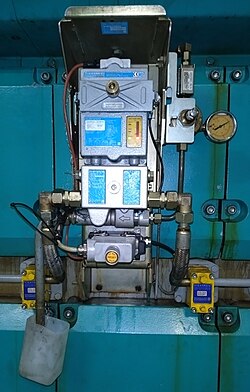Chemistry:Oil mist
Oil mist refers to oil droplets suspended in the air in the size range 1~10 μm.
Formation of Oil Mist
Oil mist may form when high pressure fuel oil, lubricating oil, hydraulic oil, or other oil is sprayed through a narrow crack, or when leaked oil connects with a high temperature surface, vaporizes, and comes in contact with low air temperature.
This happens while the fluids interact with the moving parts during machining.[1]
Smaller oil droplets than oil mist are difficult to generate under normal circumstances.
Bigger oil droplets than oil mist remain in spray form; this has the advantage of a higher ignition temperature. It sinks easily, reducing fire hazard. Oil mist inside the crankcase can cause a bigger problem.
Risks
When the concentration of oil mist increases and reaches the lower explosion limit (LEL; 50 mg/ℓ, as defined by the IACS), explosion may occur when the mist contacts surfaces of over 200 °C (392 °F) or a spark.
The International Association of Classification Societies (IACS) mandates that all ships with a cylinder diameter greater than 300mm or engine power over 2,250 kW must be equipped with either bearing temperature detectors or oil mist detectors.[2]

In regards to occupational exposures, the Occupational Safety and Health Administration and the National Institute for Occupational Safety and Health have set occupational exposure limits at 5 ppm over an eight-hour time-weighted average, with a short-term exposure limit at 10 ppm.[3]
Related accidents
- 2010 Puebla oil pipeline explosion : The 2010 Puebla oil pipeline explosion was a large oil pipeline explosion in Mexico. In the central part of Mexico, 28 people were killed by the explosion.[4]
References
- ↑ "What is oil mist". http://www.plymovent.com/int-en/solutions/oil_mist/about_oil_mist/what_is_oil_mist.aspx. Retrieved April 2, 2014.
- ↑ "A Current List of Cruise Ship Incidents - Ship Fires". Shipdetective.com. http://www.shipdetective.com/advice/safety/fires.htm. Retrieved 2013-09-06.
- ↑ CDC - NIOSH Pocket Guide to Chemical hazards
- ↑ "Mexico Pipeline Explosion Kills 28". http://www.voanews.com/content/mexico-pipeline-explosion-kills-28-112182309/132525.html. Retrieved April 2, 2014.
External links
1 International Maritime Organization (IMO)
- GUIDELINES FOR THE MANUFACTURE AND INSTALLATION OF OIL MIST DETECTORS[yes|permanent dead link|dead link}}]
- CODE OF PRACTICE FOR ATMOSPHERIC OIL MIST DETECTORS
2 International Association of Classification Societies Ltd unified requirements concerning MACHINERY INSTALLATIONS
- M10 Protection of internal combustion engines against crankcase explosions
- M67 Type Testing Procedure for Crankcase Oil Mist Detection and Alarm Equipment
3 Oil Companies International Marine Forum Ship Inspection Report (SIRE) Programme/ Vessel Inspection Questionnaires for Oil Tankers, Combination Carriers, Shuttle Tankers, Chemical Tankers and Gas Carriers
 |
